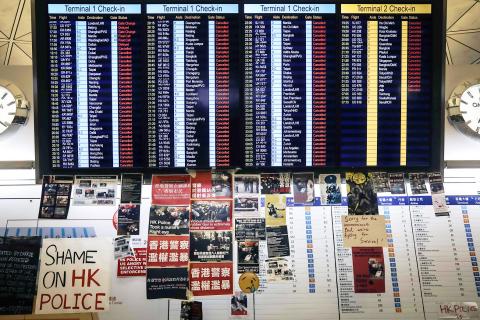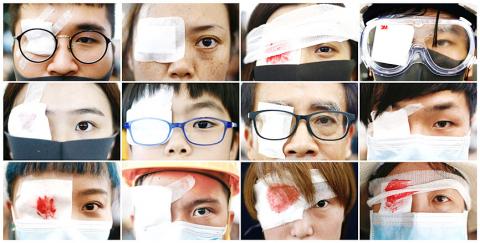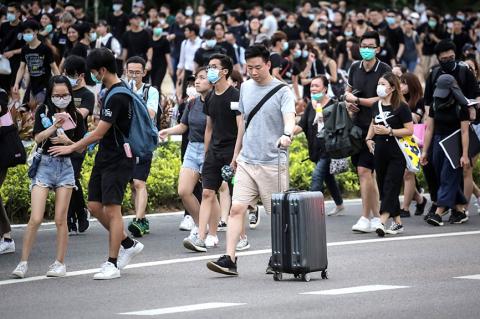One of the world’s busiest airports yesterday canceled all flights after thousands of pro-democracy demonstrators crowded into the main terminal of Hong Kong International Airport, while the central government in Beijing issued an ominous characterization of the protest movement as something approaching “terrorism.”
The extreme action by the largely leaderless movement seemed calculated to prompt a stern response from Beijing, and Chinese President Xi Jinping’s (習近平) administration responded within hours.
The Chinese State Council’s Hong Kong and Macau Affairs Office issued a statement saying the situation in Hong Kong was “beginning to show the sprouts of terrorism” and constituted an “existential threat” to the population.

Photo: AFP
“One must take resolute action toward this violent criminality, showing no leniency or mercy,” said the statement, attributed to spokesman Yang Guang (楊光). “Hong Kong has reached an inflection point where all those who are concerned about Hong Kong’s future must say ‘no’ to law breakers and ‘no’ to those engaged in violence.”
No new violence was reported by yesterday evening, although the territory remained on edge after more than two months of near-daily and increasingly bloody confrontations between protesters and police.
Beijing tends toward a broad definition of terrorism, including in it nonviolent protests of government policies on the environment or in minority regions such as Xinjiang and Tibet.

Photo: Reuters
Such a designation adds to the regime’s descriptions of protesters as clowns, criminals and traitors intent on overthrowing Chinese rule in Hong Kong.
A crowd of protesters that authorities said numbered more than 5,000 descended on the airport yesterday carrying placards and chanting slogans about police violence.
Hong Kong International Airport said in a statement the demonstration “seriously disrupted” airport operations.

Photo: AFP
Only flights that had already started boarding or those cleared for landing were allowed to use runways at the airport.
“All other flights have been canceled for the rest of today,” the airport statement said.
It later said flights would resume at 6am this morning.
Joydeep Chakravarti, a software engineer whose connecting flight to San Francisco was canceled during a layover in Hong Kong, expressed frustration that he was told to leave the airport when he wanted to stay inside the terminal.
“I don’t know what’s out there, so I don’t want to leave. I didn’t make any plans for Hong Kong,” said Chakravarti, who had a carry-on bag with laptop, charger and an extra shirt while the rest of his luggage already was checked in on his Singapore Airlines flight.
A massive traffic jam soon formed on the highway leading back to Hong Kong’s city center, but hundreds of protesters remained in the arrivals hall well into the night with no sign of leaving.
Some protesters were seen walking toward the airport amid the stifling heat.
At the airport, a flight attendant protesting on his day off, who gave only his surname, Lau, to avoid repercussions from his employer, said heavy-handed police tactics had alienated some people.
“The police have told a lot of lies to Hong Kong people. We cannot believe them anymore. We have to come here to protest,” Lau said.
Another protester, who identified herself only as Bea, said she took the day off from work to express her outrage because “I feel that I have to do something ... It’s just too sad to see what has happened. The police action has gone totally nonsensical.”
Later yesterday, two Chinese state media outlets ran videos showing armored personnel and troop carriers purportedly driving to Shenzhen, which borders Hong Kong.
The Global Times said the Chinese People’s Armed Police were assembling “in advance of apparent large-scale exercises.”
In an interview in Berlin, Chinese dissident artist Ai Weiwei (艾未未) said China’s leadership can now only resort to force, since it has failed in its quest to win hearts and minds in Hong Kong.
“Hong Kong people will not be the loser, because they’re on the right side of history,” he said.
Additional reporting by AFP

INVESTIGATION: The case is the latest instance of a DPP figure being implicated in an espionage network accused of allegedly leaking information to Chinese intelligence Democratic Progressive Party (DPP) member Ho Jen-chieh (何仁傑) was detained and held incommunicado yesterday on suspicion of spying for China during his tenure as assistant to then-minister of foreign affairs Joseph Wu (吳釗燮). The Taipei District Prosecutors’ Office said Ho was implicated during its investigation into alleged spying activities by former Presidential Office consultant Wu Shang-yu (吳尚雨). Prosecutors said there is reason to believe Ho breached the National Security Act (國家安全法) by leaking classified Ministry of Foreign Affairs information to Chinese intelligence. Following interrogation, prosecutors petitioned the Taipei District Court to detain Ho, citing concerns over potential collusion or tampering of evidence. The

‘FORM OF PROTEST’: The German Institute Taipei said it was ‘shocked’ to see Nazi symbolism used in connection with political aims as it condemned the incident Sung Chien-liang (宋建樑), who led efforts to recall Democratic Progressive Party (DPP) Legislator Lee Kun-cheng (李坤城), was released on bail of NT$80,000 yesterday amid an outcry over a Nazi armband he wore to questioning the night before. Sung arrived at the New Taipei City District Prosecutors’ Office for questioning in a recall petition forgery case on Tuesday night wearing a red armband bearing a swastika, carrying a copy of Adolf Hitler’s Mein Kampf and giving a Nazi salute. Sung left the building at 1:15am without the armband and apparently covering the book with a coat. This is a serious international scandal and Chinese

Seventy percent of middle and elementary schools now conduct English classes entirely in English, the Ministry of Education said, as it encourages schools nationwide to adopt this practice Minister of Education (MOE) Cheng Ying-yao (鄭英耀) is scheduled to present a report on the government’s bilingual education policy to the Legislative Yuan’s Education and Culture Committee today. The report would outline strategies aimed at expanding access to education, reducing regional disparities and improving talent cultivation. Implementation of bilingual education policies has varied across local governments, occasionally drawing public criticism. For example, some schools have required teachers of non-English subjects to pass English proficiency

TRADE: The premier pledged safeguards on ‘Made in Taiwan’ labeling, anti-dumping measures and stricter export controls to strengthen its position in trade talks Products labeled “made in Taiwan” must be genuinely made in Taiwan, Premier Cho Jung-tai (卓榮泰) said yesterday, vowing to enforce strict safeguards against “origin laundering” and initiate anti-dumping investigations to prevent China dumping its products in Taiwan. Cho made the remarks in a discussion session with representatives from industries in Kaohsiung. In response to the US government’s recent announcement of “reciprocal” tariffs on its trading partners, President William Lai (賴清德) and Cho last week began a series of consultations with industry leaders nationwide to gather feedback and address concerns. Taiwanese and US officials held a videoconference on Friday evening to discuss the